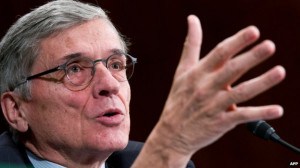 AT&T violated the transparency rules of the Federal Communications Commission not less than a million times by allegedly deceiving customers about an unlimited data plan that was speed throttled to unusability after as little as 3GB of usage a month. As a result, the FCC today fined AT&T $100,000,000.
AT&T violated the transparency rules of the Federal Communications Commission not less than a million times by allegedly deceiving customers about an unlimited data plan that was speed throttled to unusability after as little as 3GB of usage a month. As a result, the FCC today fined AT&T $100,000,000.
“Consumers deserve to get what they pay for,” said FCC chairman Tom Wheeler. “Broadband providers must be upfront and transparent about the services they provide. The FCC will not stand idly by while consumers are deceived by misleading marketing materials and insufficient disclosure.”
From the Notice of Apparent Liability:
Based on the facts and circumstances before us, we find that AT&T apparently willfully and repeatedly violated Section 8.3 of the Commission’s Rules by:
- using the term “unlimited” in a misleading and inaccurate way to label a data plan that was in fact subject to prolonged speed reductions after a customer used a set amount of data; and
- failing to disclose the data throughput speed caps it imposed on customers under the MBR policy.
In short:
“Unlimited means unlimited,” said FCC Enforcement Bureau chief Travis LeBlanc. “As today’s action demonstrates, the Commission is committed to holding accountable those broadband providers who fail to be fully transparent about data limits.”
This is the largest proposed fine in FCC history, according to a senior FCC official. The official told the Wall Street Journal AT&T made billions of dollars off the practice.

Wheeler
Thousands of AT&T customers have complained about the practice and feel misled about the company limiting an unlimited use plan.
“A provider cannot announce something in large type that it contradicts in fine print; such practices would be inherently misleading to consumers, and, therefore contrary to both the spirit and letter of the Open Internet Transparency Rule,” the FCC notice states.
The FCC’s two minority Republican commissioners strongly disagreed with the action against AT&T. Ajit Pai used his dissent to cut and paste large sections of AT&T’s website in defense of the company.
“Because the Commission simply ignores many of the disclosures AT&T made; because it refuses to grapple with the few disclosures it does acknowledge; because it essentially rewrites the transparency rule ex post by imposing specific requirements found nowhere in the 2010 Net Neutrality Order; because it disregards specific language in that order and related precedents that condone AT&T’s conduct; because the penalty assessed is drawn out of thin air; in short, because the justice dispensed here condemns a private actor not only in innocence but also in ignorance, I dissent,” Pai wrote.
 Commissioner Michael O’Rielly dissented because he felt the FCC was overreacting to AT&T’s throttling program and assumed harm was done to every customer affected by it.
Commissioner Michael O’Rielly dissented because he felt the FCC was overreacting to AT&T’s throttling program and assumed harm was done to every customer affected by it.
“I firmly believe that the Commission must take the necessary steps to enforce its regulations,” O’Rielly wrote. “But, it is equally important that the Commission’s enforcement procedures be fair and equitable. Licensees must have faith in the process and trust that the government is working in a sound and just manner, instead of vilifying them, or demanding that they incriminate themselves.”
“We will vigorously dispute the FCC’s assertions,” said Michael Balmoris, an AT&T spokesman. “The FCC has specifically identified this practice as a legitimate and reasonable way to manage network resources for the benefit of all customers. We have been fully transparent with our customers” and exceeded FCC disclosure requirements, Balmoris said.
AT&T only imposes its speed throttle on unlimited data plan customers who exceed 3GB of usage. Customers on usage-based billing plans do not face a speed throttle after exceeding 3GB of usage.


 Subscribe
Subscribe
So when will the data caps on AT&T’s DSL service come into question?
As I recall, ATT covered their ass by explaining that “unlimited” only meant you could use their service any time of day, not that they would feed you as much data as that connection could handle over the course of the billing cycle. So if your tier was fast enough, your “unlimited” Internet ended after a few hours or minutes. Suckers.
The economics works like this:
1) Corporation does something unethical and illegal that makes them billions of dollars.
2) For the heck of it, they spend a million defending themselves in court.
3) Court fines them just a hundred million dollars.
4) Corporation eagerly goes on operating unethically and breaking laws.
The fine needs to equal the profit + a painful penalty. Any 6th grader could tell you that.
In Oligopoly and Monopoly business situations the cost of fines are ultimately born by the consumer. The financial pain is not inflicted on the Company or the Shareholder; eventually it is simply passed along to the consumer.